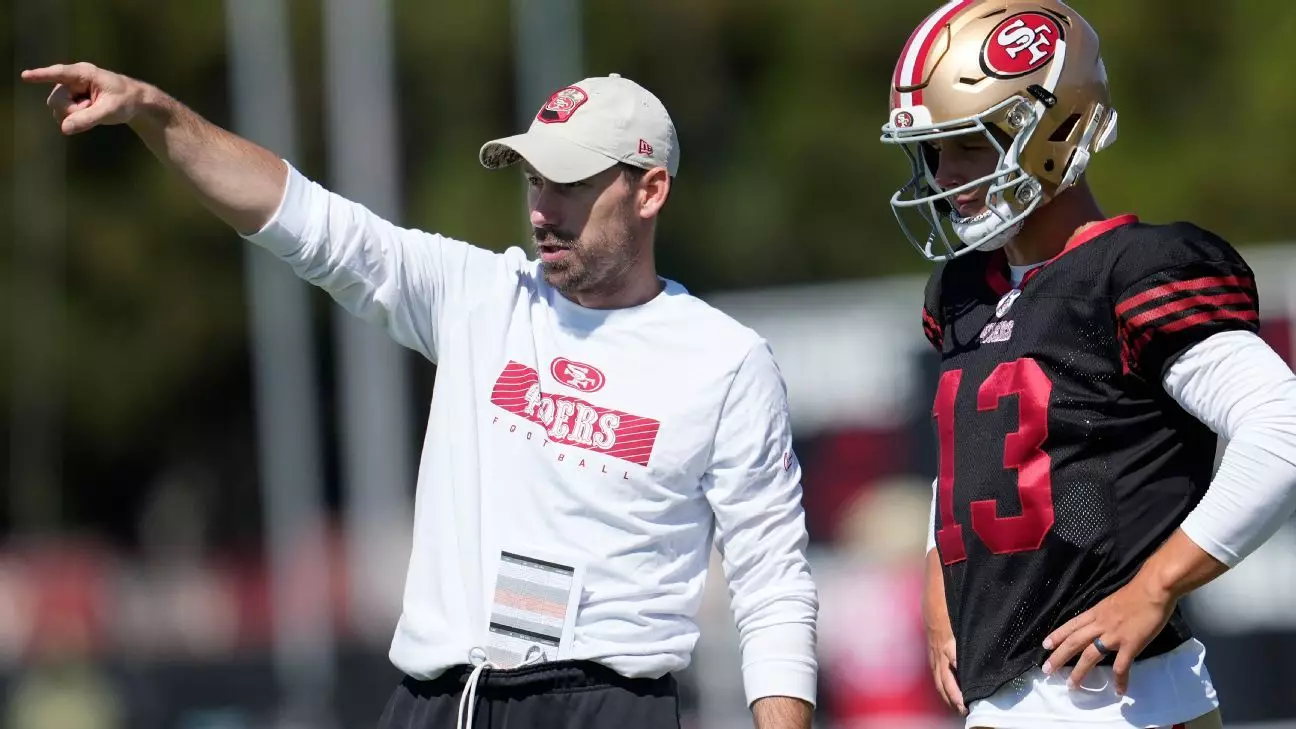The San Francisco 49ers have recently made waves in the NFL with a significant reshuffling of their coaching staff following a lackluster 2024 season. Head coach Kyle Shanahan has opted for a comprehensive overhaul, highlighting not only the necessity for change but also the ambition to reinvigorate the team’s performance in the upcoming season. With a strategic blend of promoting internal talent and hiring experienced coaches, Shanahan aims to boost the 49ers’ chances for success moving forward.
A Strategic Shift in Coaching Roles
One of the most notable changes involves the promotion of Klay Kubiak to offensive coordinator. Kubiak has been an integral part of the team for four seasons, moving through various roles that have positioned him as a vital cog in the offensive machinery. From serving as the offensive passing game specialist to assistant quarterback coach, his evolution reflects a steady accumulation of expertise and trust from Shanahan. During the end-of-season press briefing, Shanahan affirmed Kubiak’s qualifications, emphasizing his consistent performance and contribution to the offense. This move not only solidifies Kubiak’s status but also indicates Shanahan’s commitment to retaining proven talent within the organization.
However, despite this promotion, Shanahan has decided to maintain his role as the playcaller for the offense, leading to speculation about how this dual responsibility might affect the cohesion of their game strategy. While Kubiak’s official title signals recognition of his capabilities, it raises questions about the distribution of authoritative voices within the offensive unit.
Another significant adjustment belongs to the quarterbacks coach position, which Brian Griese has vacated after three seasons. Griese played a crucial role in identifying and nurturing talent like Brock Purdy, who emerged as a promising quarterback. The decision for Griese to step away from coaching, while somewhat unexpected, opens a window for Mick Lombardi, who has been appointed as the new quarterbacks coach. Lombardi’s previous experience as a senior offensive assistant will be put to the test as he steps up to ensure continuity in quarterback development. This transition signifies not just a change in personnel but also a potential alteration in the approach to quarterback training.
As the 49ers gear up for the new season, the question looms: how will these shifts in coaching affect the immediate future of their quarterback lineup? Lombardi’s successful integration into this role will be crucial as he aims to foster growth and stability in a vital position fraught with expectations.
On the defensive end, under the stewardship of defensive coordinator Robert Saleh, the team has infused experienced coaching talent like Gus Bradley into the mix. Bradley’s extensive coaching background, particularly as a defensive coordinator and head coach, presents an opportunity for the 49ers to enhance their defensive strategies. As an assistant head coach of defense, Bradley’s insights and methodologies can play an instrumental role in reshaping a defense that has already shown potential but has struggled to achieve consistency. His vast understanding of defensive dynamics will be pivotal as Saleh looks to refine the unit’s execution.
Additionally, the inclusion of new personnel such as Colt Anderson (assistant special teams), Ray Brown (defensive backs/cornerbacks), and Greg Scruggs (assistant defensive line) further illustrates a tactical approach to rounding out the coaching staff with diversified specializations. Each addition brings a fresh perspective to the coaching room, promoting a more robust dialogue on defensive scheming and tactics.
The recent coaching changes within the San Francisco 49ers not only reflect a commitment to improvement following an underwhelming season but also signify a deeper understanding of the importance of adaptability in the ever-evolving landscape of the NFL. Shanahan’s strategic appointments indicate a deliberate effort to leverage the experience of seasoned coaches while empowering internal talent.
As the organization rebuilds its framework, fans and analysts alike will be eager to observe how these changes translate to the field. The 49ers are poised for a pivotal season ahead, making it essential for this new coaching structure to gel effectively for sustained success. While the path to revitalization may be fraught with challenges, the intent behind these moves signals an optimistic outlook for one of the league’s historic franchises.

